Pampering Your Pet Guinea Pig: What to Look for in High-Quality Pellets for Guinea Pigs
Discover key factors in selecting high-quality guinea pig pellets—nutrition, ingredients, and what to avoid for your pet's health.
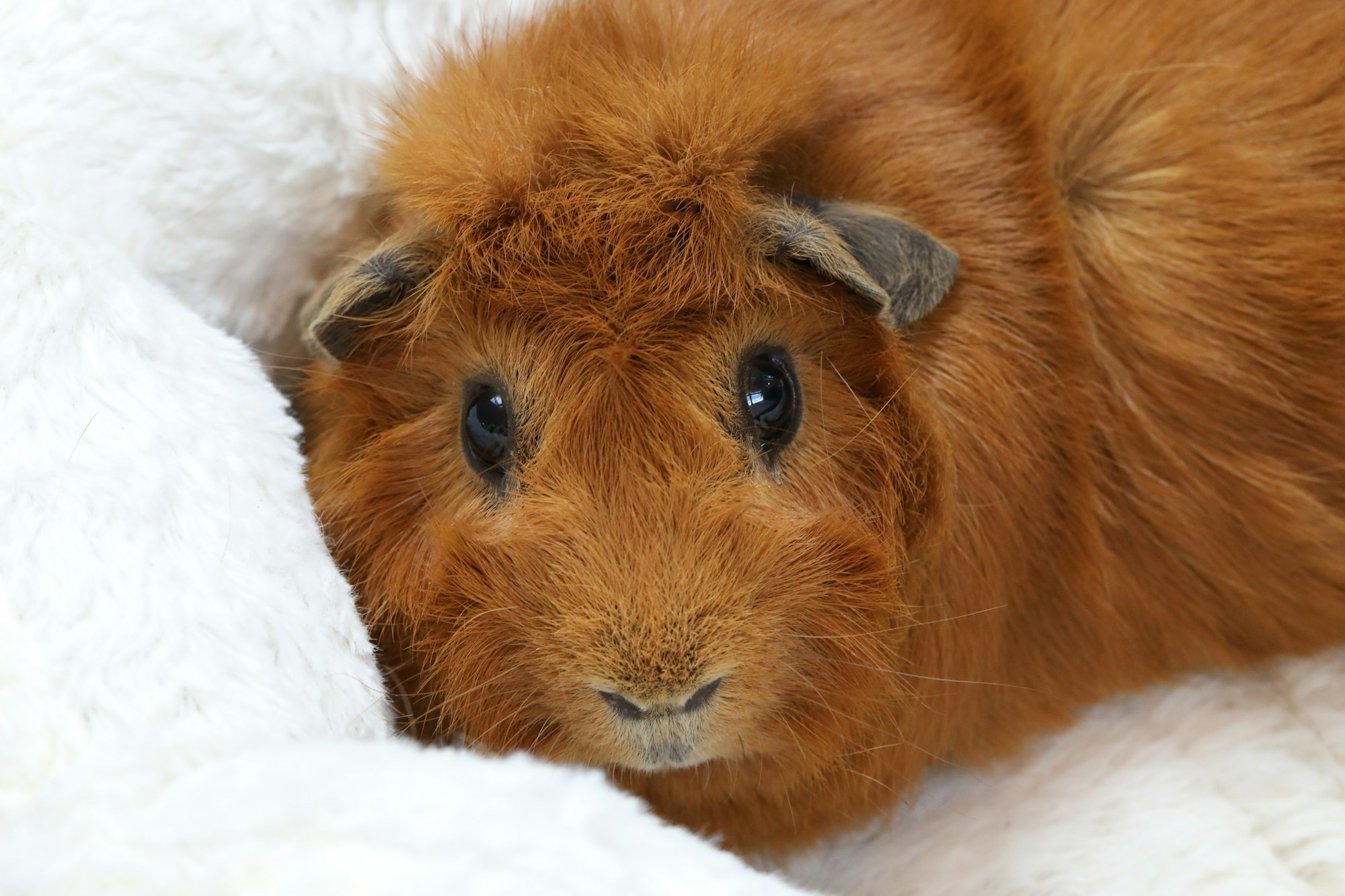
When it comes to feeding your furry friend, choosing the right pellets for guinea pigs can make all the difference in their health and happiness. This comprehensive guide will walk you through the essentials of selecting the best guinea pig pellets, ensuring your pet thrives on a diet that's as nutritious as it is delicious.
Key Takeaways:
- Essential Nutrients: Look for pellets rich in stabilized Vitamin C and other essential vitamins and minerals.
- Quality Ingredients: Opt for pellets that contain high-quality, natural ingredients without artificial colors or preservatives.
- Appropriate for Life Stage: Ensure the pellets suit the specific life stage of your guinea pig, whether they are young, adult, or lactating.
Understanding Guinea Pig Dietary Needs
Guinea pigs require a balanced diet consisting of hay, fresh vegetables, and high-quality guinea pig pellets. Pellets should provide complete nutrition, making up a crucial part of their daily diet. It's vital to choose a product that complements unlimited grass hay and fresh water, which should be the mainstay of their intake.
The Importance of Stabilized Vitamin C
Unlike other pets, guinea pigs cannot produce Vitamin C on their own and must obtain it from their food. Look for pellets that contain stabilized Vitamin C, as this is crucial for preventing scurvy, a common health issue in guinea pigs. This vitamin also supports overall body health, aiding in proper development and maintenance.
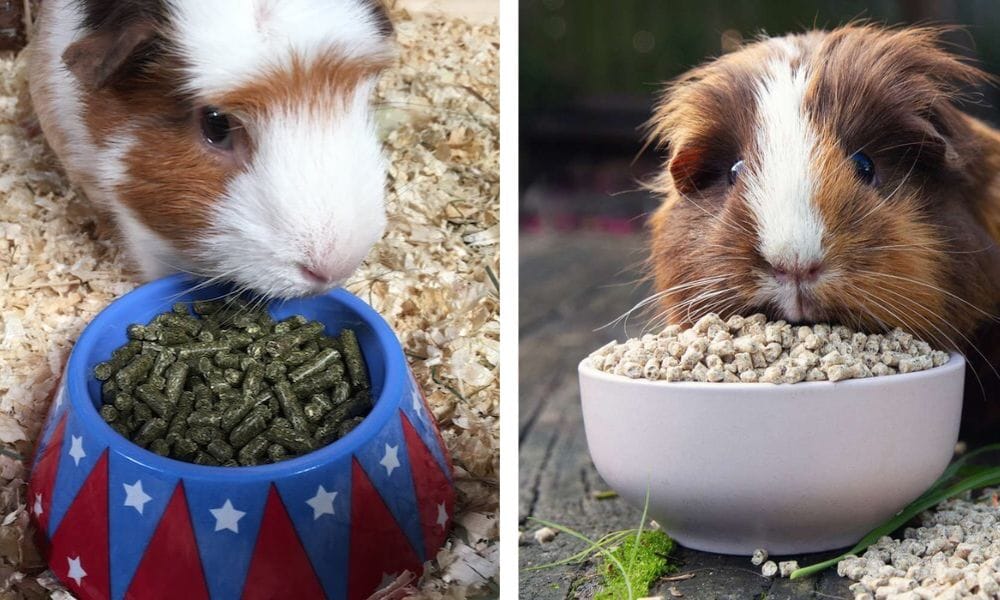
High-Quality Ingredients Are Key
The best guinea pig food will have high-quality ingredients like Timothy hay, orchard hay, or other botanical grass hays. Avoid pellets that contain fillers like soybean meal, wheat middlings, or corn, which offer little nutritional value and may lead to obesity and other health issues.
No Artificial Colors or Preservatives
To ensure whole body health for your guinea pig, choose pellets that are free from artificial colors, flavors, and preservatives. Natural ingredients are more easily digestible and safer for your guinea pig, promoting healthy digestion and reducing the risk of allergies or sensitivities.
Healthy Diet
Caring for a pet guinea pig involves more than just providing fresh hay and water every day. It’s important to feed them a healthy, balanced diet with plenty of fresh fruits and vegetables. A good mix should include vitamin C-rich treats like kale, apples, oranges, and carrots; dark green leafy vegetables like spinach; and some high-quality pellets specifically designed for guinea pigs. Pay attention to serving sizes too—too much food can lead to obesity in these little critters!
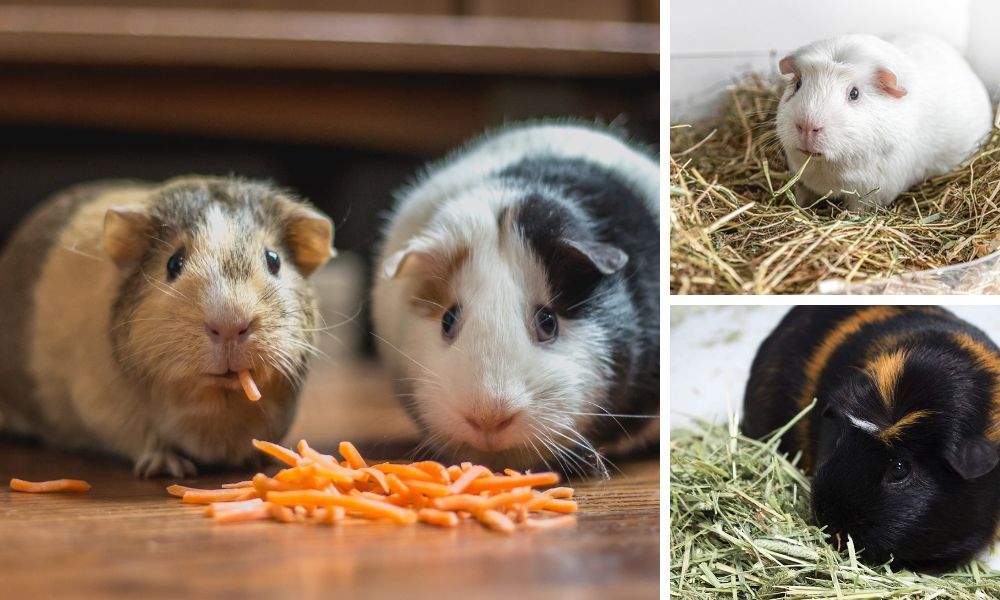
Guinea Pig Eating Carrots and Hay
Guinea pigs need a well-balanced diet that includes hay, fresh veggies, and pellets, which are rich in fibers, vitamins, and minerals. Avoid feeding them sugary or fatty foods that can cause obesity, digestive problems, or dental issues. Also, offer your guinea pig some healthy treats such as fresh fruit slices, or herbal snacks to add some variety to their diet. Make sure to provide fresh water at all times, and change their drinking bottle daily to prevent bacteria growth.
Suitable for Different Life Stages
Guinea pig pellets are formulated differently based on the life stage of the animal. Young and active guinea pigs, as well as pregnant or lactating females, often require more calories and nutrients. Make sure the pellets you choose are appropriate for your guinea pig's age and lifestyle needs.
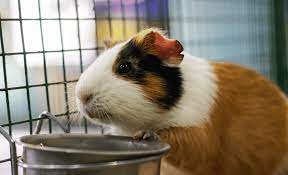
The Role of Fiber in a Guinea Pig's Diet
Fiber is essential for a guinea pig's digestion. Pellets should be high in fiber, which helps in maintaining a healthy digestive system. Look for pellets that provide additional natural fiber to support this need.
Exploring the Benefits of Botanical Grass Hays in Guinea Pig Diets
Botanical grass hays, like Oxbow's Western Timothy and Orchard Hay, are not just your average chew for guinea pigs; they're a cornerstone of optimal health. These hays are packed with fiber that aids in healthy digestion and ensures that your guinea pig's gastrointestinal tract is running smoothly. Unlike cheaper brands that might skimp on quality, these premium hays provide a rich source of natural fiber, making them an integral part of a guinea pig's daily diet. They not only satisfy the natural foraging instincts of guinea pigs but also help maintain dental health by encouraging natural chewing behavior.
Moreover, botanical grass hays are essential for more than just fiber; they contain a variety of essential vitamins and minerals that contribute to overall body health. For instance, Timothy hay, a favorite among pet owners, is low in calcium which is beneficial for preventing urinary issues in guinea pigs. These hays are also free from artificial colors and preservatives, making them a safe and natural choice for your pet. By integrating fresh grass hay into your guinea pig's diet, you're ensuring they receive a balanced mix of nutrients that supports everything from their teeth to their digestive system.
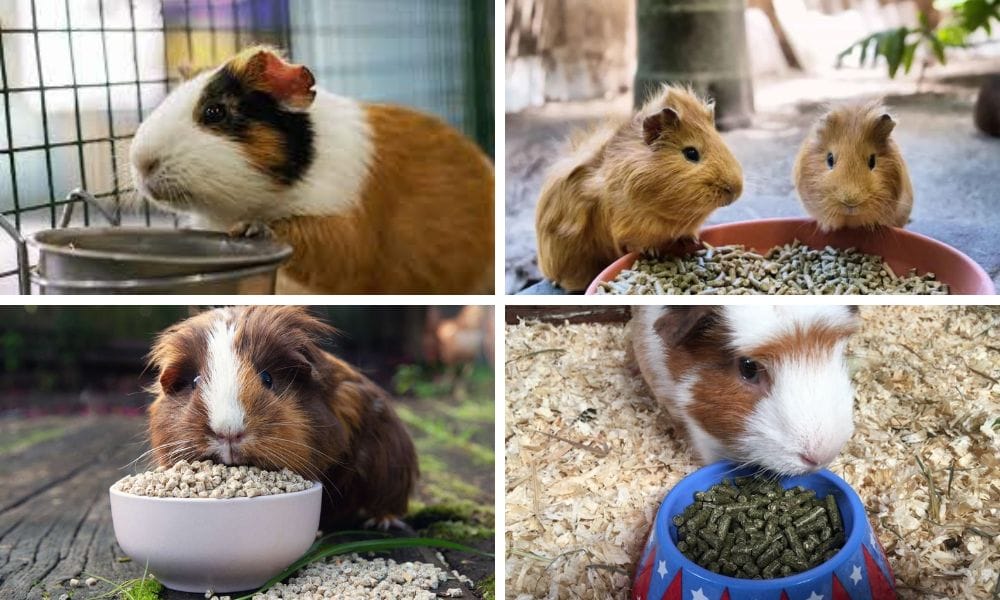
Exploring the Nutritional Impact of Soybean Meal in Guinea Pig Pellets
Soybean meal, often spotted on the ingredient lists of high-quality guinea pig pellets, plays a pivotal role in ensuring complete nutrition for your furry friends. Rich in protein, it supports muscle development and overall body health, making it an excellent choice for guinea pigs of all ages. Whether it's a sprightly young guinea pig or a mature one, the inclusion of soybean meal in their diet helps maintain their energy levels and supports an active lifestyle.
However, it's not just about protein. Soybean meal also contributes to healthy digestion in guinea pigs. The fiber content aids in the smooth functioning of their digestive system, preventing common issues like gastrointestinal stasis, which can be a concern for many small animals. Pet owners should look for pellets that list soybean meal as a component to ensure their guinea pigs are getting a diet that supports both their muscular and digestive health, steering clear of cheaper brands that might skimp on this valuable ingredient.
The Benefits of Including Folic Acid in Guinea
The Importance of Proper Mineral Balance in Guinea Pig Pellets
When selecting guinea pig pellets, it's crucial to consider the mineral content, especially elements like zinc sulfate and copper sulfate, which play significant roles in maintaining a guinea pig's health. Zinc sulfate helps in skin health and wound healing, while copper sulfate is vital for forming red blood cells and maintaining nerve fibers and the immune system. A well-balanced pellet will include these minerals in the right proportions to support whole body health without causing harm due to excess.
Additionally, pellets formulated for guinea pigs often include other minerals like manganous oxide and calcium, which need to be carefully balanced, particularly in mature guinea pigs. Excessive calcium can lead to kidney stones, whereas too little can lead to weak bones. Therefore, choosing a pellet that offers complete nutrition, like those supplemented with vitamin D and magnesium for optimal calcium absorption, is key. This careful balance helps ensure that your guinea pig isn't just eating; they're thriving on a diet that supports their active lifestyle and long-term health.
Avoiding Harmful Ingredients
Some pellets may contain harmful ingredients like seeds and nuts, which are not suitable for guinea pigs and can cause choking or severe health issues. Always read the ingredient list carefully to ensure the safety of the food.
Pellets as Part of a Balanced Diet
While pellets are an important part of a guinea pig's diet, they should not be the sole component. A balanced diet includes a mix of hay, fresh vegetables, and a limited amount of fruit, along with high-quality pellets. This variety ensures that guinea pigs receive all necessary nutrients.
Checking for Freshness
Always check the packaging date and ensure you buy the freshest pellets available. Stale food can lose its nutritional value and might not be as appealing to your guinea pig.
Quantity and Feeding Guidelines
Follow the feeding guidelines on the pellet package to avoid overfeeding or underfeeding. Most guinea pigs will thrive on a daily portion of pellets alongside their hay and water.
What Pet Owners Say
Reviews and recommendations from other guinea pig owners can be invaluable. Look for brands that are highly rated by the community and have a reputation for quality and consistency.
Where to Buy High-Quality Pellets
You can purchase high-quality guinea pig pellets at pet stores, online retailers, or directly from manufacturers. Ensure you are buying from reputable sources to guarantee the quality of the pellets.
Summary
Choosing the right pellets for your guinea pig involves understanding their nutritional needs and selecting a product that meets these requirements without compromising on quality. By focusing on stabilized Vitamin C, natural ingredients, and appropriate formulations for different life stages, you can ensure your guinea pig enjoys a healthy, balanced diet.
FAQ
Q: How often should I feed my guinea pig pellets? A: Guinea pigs should have access to pellets daily as part of a balanced diet, but the exact amount depends on their size, age, and activity level. Refer to the feeding guidelines on the pellet package.
Q: Can guinea pigs survive on pellets alone? A: No, guinea pigs need a varied diet that includes unlimited grass hay, fresh vegetables, and a moderate amount of pellets. This variety is crucial for their overall health.
Q: How do I switch my guinea pig to a new pellet brand? A: Transition your guinea pig slowly by mixing the new pellets with the old ones over a period of 7-10 days. This gradual change helps prevent digestive upset and allows your guinea pig to adjust to the new food.
Provide Regular Grooming Opportunities
Regular grooming not only helps keep your guinea pig looking good—it also keeps them healthy by removing dander, dead skin cells, dirt, parasites, and other debris from their fur. Gently brush their coat with a soft-bristled brush once a week or so; if they have long hair you may even want to use a comb instead! Make sure you pay special attention to areas around the eyes and ears since these tend to be difficult places for them to groom themselves effectively. If needed you can trim their nails but do so carefully as cutting too short could cause injury or bleeding.
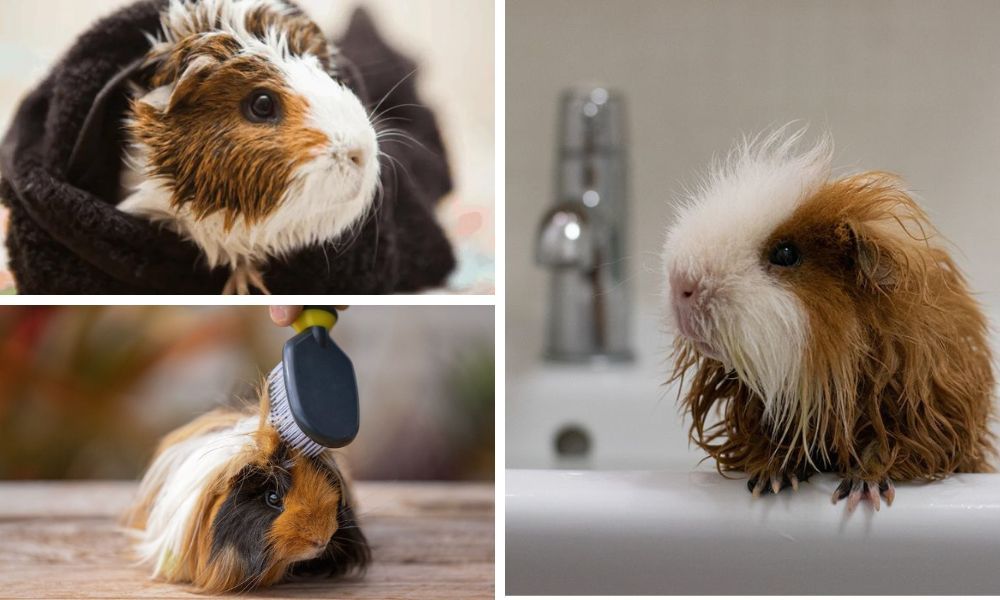
Bathing and Grooming Guinea Pigs
Looking for the best food for your guinea pig? We have done all the research for you and put together our list of high quality pellet foods for guinea pigs you can buy today! Tap the link below to see the list now!

